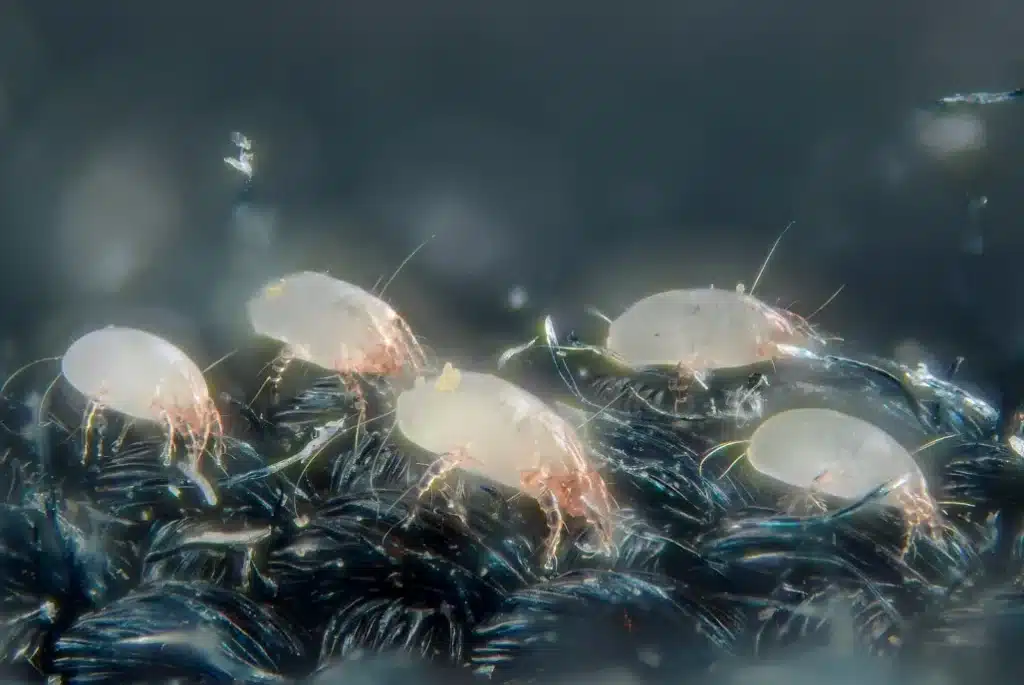Last updated on November 20th, 2023 at 09:31 pm
Seasonal allergies are nothing to sniff at. They affect millions of people around the world and commonly cause discomforts like:
- Sneezing
- A runny nose
- Itchy eyes
- Congestion in the ears, nose, or chest
- A scratchy throat
- Post-nasal drip
While many individuals are familiar with the basics of allergic rhinitis, some lesser-known facts could help you better understand and manage your symptoms.
Below are three surprising and important details about these reactions you might not know about. Whether you’re a long-time hay fever veteran or just beginning to experience seasonal allergies, our insights help you stay informed and take control of your wellness.
1. Your Runny Nose Gets Worse at Night
No, it’s not just in your head. You finish your evening routine, climb into bed, and immediately feel congested.
There’s some valid evidence confirming your symptoms are worse at night. Research suggests individuals with allergic rhinitis experience lower-quality sleep than healthy subjects and often wake from slumber due to discomfort [1].
Without a decent night’s rest, you end up feeling tired and grumpy the following morning [2]. Exhaustion also impairs your performance at work and heightens your stress response, which, ironically, makes it harder for you to fall asleep [3].
A few factors could exacerbate your seasonal allergy symptoms during the evening.
Many people are hypersensitive to things in their bedrooms, particularly the dust mites that colonize carpeting, pillows, mattresses, and box springs. Long-term exposure to these tiny bugs kicks your immune system into high gear, causing sneezing and a runny nose [4].

Grass, weed, and tree pollen are some of the most common triggers of nighttime sniffles. Particles lingering on your skin, hair, and clothes often end up in your bed and may result in allergy symptoms. This plant powder also aggravates respiratory conditions like asthma [5].
Gravity plays a part, too. Because of the anatomy of the nose and throat, lying down leads to a post-nasal drip that worsens coughing and causes breathing difficulties.
Fortunately, there are a few ways to achieve better sleep during allergy season:
| Tip | Key Advantages |
| Use an air purifier | Reduces exposure to allergens at night |
| Keep windows closed | Prevents pollen and pollutants from entering your home |
| Wash bedding frequently | Removes allergens that may have accumulated on sheets and pillowcases and kills dust mites |
| Shower before bed | Prevents transferring pollen to your bed |
| Sleep propped up on pillows | Helps prevent a post-nasal drip and improves breathing |
Evenings are also the prime time to try natural antihistamines like D-Hist. This formula provides optimal nasal and sinus cavity support for individuals anticipating the respiratory irritation that sometimes occurs with seasonal changes.
There’s also an option for children who experience nightly hay fever reactions. D-Hist Junior includes the same targeted blend of nutrients that encourages mucosal tissue health as the adult formula in a great-tasting chewable tablet. D-Hist Junior contains smaller amounts of each ingredient and is formulated just for kids.
2. Climate Change Is Making Allergy Symptoms Worse
If you’re convinced your spring allergies worsen yearly, you’re not alone. Warming temperatures and rising carbon dioxide levels contribute to longer, more intense pollen seasons, affecting people’s health.
Scientists have discovered that pollen counts have increased by over 21% in North America, with the season being more than 20 days longer than it was in 1990 [6]. Human-caused climate change is the primary driver behind these changing conditions.
The elevated carbon dioxide levels in the atmosphere encourage plants to bloom more, increasing their pollen production [7]. In addition, air pollution particulates attach to this reproductive powder and cause it to explode, creating tiny pieces easily able to enter the respiratory tract [8].
These aren’t the only causes of you having to soothe airborne irritants in your throat. Researchers have found that pollen has become more potent, meaning far less of the substance could trigger a reaction than several years ago [9].
Pollen concentration upticks might have significant, long-lasting impacts on health, especially for those with illnesses like asthma. Even people who’ve never had allergies before could start experiencing them and become more susceptible to respiratory viruses.
It’s enough to make you want to stay indoors forever, but don’t invest in your bubble suit just yet. There are a few simple steps that could keep these allergies in check.
View the pollen forecasts in your area regularly and limit outdoor activity while keeping windows closed during peak hours. It could also help to avoid hanging any laundry outside that could attract the powder.
Most importantly, support optimal respiratory function by including Sinuplex in your wellness regimen.
This unique blend provides the exceptional benefits of stinging nettle extract and vitamin C to encourage healthy sinuses, lungs, and nasal passages.
3. Don’t Wait for Hay Fever Symptoms to Start Before Treating Them
The secret to living with allergies is to be prepared. If your symptoms are predictable, don’t wait until they set in to treat them.
Taking allergy medications around two weeks before peak season could lessen the severity of your reactions [10]. An effective pretreatment strategy could even prevent the inflammation that causes many of these familiar discomforts.
Some medications take a few weeks to become fully effective, so using them early gives your body the best chance of defense.
However, you can only safely start certain drugs in advance, like corticosteroid nasal sprays. Over-the-counter antihistamines may cause drowsiness, and oral decongestants could cause issues for individuals with high blood pressure or heart problems.
Instead, consider a more natural way to arm yourself against seasonal allergies to avoid any adverse effects during pretreatment.
Quercetin is a flavonoid found in many fruits and vegetables that studies have linked to various benefits, such as lowering the risk of heart disease and degenerative brain disorders [11, 12].
The compound’s anti-inflammatory properties may provide allergy symptom relief by blocking the enzymes that promote histamine [13].
Bromelain, a protein-digesting enzyme from pineapples, also reduces inflammation in the nasal passages [14].
By supplementing your diet with a Quercetin-Bromelain Complex, the two compounds could work together to produce a greater effect. The anti-inflammatory characteristics of both products may reduce the severity and frequency of allergy symptoms like sneezing and itchy eyes.
Take Charge of Your Allergic Rhinitis
Seasonal allergies are frustrating and uncomfortable, especially during peak hay fever season. However, with the right information and an effective pretreatment strategy, you could take control of your symptoms and enjoy a life free of coughs and sniffles.
Simply Nutrients encourages people to take charge of their wellness. Our premium range of supplements includes options that have the potential to treat seasonal allergies and promote overall health.
Contact us for more information on making diet and lifestyle changes that could help you live a more vibrant life.
Resources
[1] https://pubmed.ncbi.nlm.nih.gov/7315270/
[2] https://www.nhlbi.nih.gov/health/sleep-deprivation
[3] https://pubmed.ncbi.nlm.nih.gov/19300585/
[4] https://synapse.koreamed.org/articles/1052375
[5] https://www.sciencedirect.com/science/article/abs/pii/S009167491201024X
[6] https://www.pnas.org/doi/10.1073/pnas.2013284118
[7] https://climatehealthconnect.org/wp-content/uploads/2016/09/Allergens.pdf
[8] https://www.ncbi.nlm.nih.gov/pmc/articles/PMC5941124/
[9] https://www.ars.usda.gov/research/publications/publication/?seqNo115=169170
[10] https://acaai.org/news/want-more-than-romance-this-valentines-day-halt-spring-allergy-symptoms-before-they-start/
[11] https://pubmed.ncbi.nlm.nih.gov/28620474/
[12] https://pubmed.ncbi.nlm.nih.gov/25272572/
[13] https://pubmed.ncbi.nlm.nih.gov/27187333/
[14] https://pubmed.ncbi.nlm.nih.gov/24273953/
NOTHING IN THIS WEBSITE IS INTENDED AS, OR SHOULD BE CONSTRUED AS, MEDICAL ADVICE. ANY HEALTHCARE AND/OR NUTRITIONAL MATERIAL CONTAINED IN THIS WEBSITE IS FOR CONSUMER INFORMATIONAL AND EDUCATIONAL PURPOSES ONLY. SUCH MATERIAL IS NOT INTENDED AS MEDICAL ADVICE FOR CONDITIONS OR TREATMENT, NOR IS IT INTENDED AS A SUBSTITUTE FOR A MEDICAL EXAMINATION BY A HEALTHCARE PROFESSIONAL. CONSUMERS SHOULD CONSULT THEIR OWN HEALTH CARE PROFESSIONALS FOR INDIVIDUAL MEDICAL RECOMMENDATIONS.
- Magnesium Threonate: An Honest Buying Guide for Health Enthusiasts - March 21, 2024
- Magnesium Citrate Vs Glycinate: 5 Key Differences And Benefits - March 14, 2024
- How to Pick the Best Magnesium Glycinate Supplement for You - March 7, 2024




